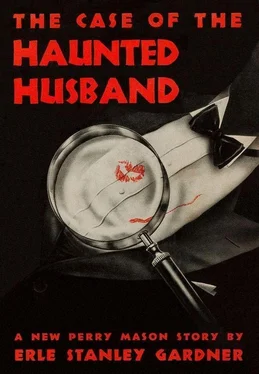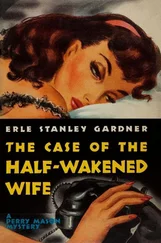“I hope it will,” Mason said. “I have got to solve a murder in order to find out what is back of the association between Homan and Greeley. I have got to find out what Greeley was doing in San Francisco, and if he hadn’t gone as far as San Francisco, where he had gone and what he was doing.”
“Why?”
“Because Greeley never stole that car. Greeley isn’t the sort who would steal a car. If he was using that car, he was using it with Homan’s permission and that means Homan is lying in his story about the car having been stolen. Homan sent Greeley on a mission of some sort, and Greeley took Homan’s car with Homan’s knowledge and consent. The only reason Homan is lying now is because he simply doesn’t dare to have the nature of that mission come out.”
“And he is willing to sacrifice me in order to keep it from coming out?”
“That’s it... and he saves himself a few thousand dollars as well.”
“And you want me to find that key in my purse, just the way...”
Mason said, “No. I want you to tell it just the way it actually happened, that you found the key in your purse when I asked you about it, there in the hospital.”
“And you gave it back to me?”
“Yes.”
She said, “Horace Homan, the producer’s younger brother, came to see me yesterday. He said he knew I hadn’t stolen the car. Seems to be very much — well, interested. He wanted me to go for a moonlight cruise on his brother’s yacht and then rang me up and said his brother had changed his mind and wouldn’t let him have the yacht.”
“Do you like him?”
“Well, he is interesting. He told me about a lot of behind the scenes stuff on Hollywood. He says his brother really doesn’t want to see me in any trouble, that if I should be convicted, they would try to get probation for me.”
“That is significant. Had he talked that over with his brother?”
“He said his brother was the one who told him. He is a very dynamic young man, isn’t he? I can’t help contrasting him with Jacks Sterne. Now...”
Judge Cortright finished scribbling his signature across a paper, and looked inquiringly down at Mason. Mason nodded, and the judge said, “Proceed, Mr. Mason.”
“I will call the defendant, Stephane Claire,” Mason said.
Stephane Claire got to her feet, walked forward, was sworn, and told her story. Hanley gave her only a perfunctory cross-examination, limited for the most part to identification of the body she had been called on to view in the Gateview Hotel as that of the man who had been driving the car.
“That is our case,” Mason said.
Judge Cortright looked at Hanley. “Any rebuttal.”
“Yes, Your Honor. I have one witness here in court and one whom I shall have to summon by telephone — man who holds an important position in a Hollywood studio. It will take him a few minutes to get here, but I think this other witness will fill in...”
“Very well, call this witness.”
“Mrs. A. P. Greeley,” Hanley said.
Mrs. Greeley, attired in black, walked slowly down the aisle of the courtroom, held up a black-gloved hand as she took the oath and settled herself in the witness chair.
“I am going to make this as brief as possible,” Hanley said. “Your name is Daphne Greeley. You are the widow of Adler Pace Greeley, a broker?”
“I am.”
“On Friday of last week you were called upon by Lieutenant Tragg of the Homicide Squad to identify a body in a room in the Gateview Hotel?”
There was a moment of silence, then Mrs. Greeley said, “Yes,” so faintly that the word was all but inaudible.
“And that body was that of your husband?”
“Yes.”
“And the same body which Stephane Claire had previously identified as being that of the driver of the car in question?”
“Yes.”
“Now, Mrs. Greeley, I want to spare your feelings as much as possible, but it is necessary that I direct your attention to Wednesday, the nineteenth of this month. Do you remember what happened on that day?”
She nodded.
“You will have to speak up, Mrs. Greeley, so that the court reporter can write down your answer. Do you remember the date?”
“Yes.”
“Is there anything in particular which fastens it upon your mind?”
“Yes. It was — it was — our wedding anniversary.”
“And can you tell us generally what your husband did on that day — as far as you know?”
“Yes. We decided that we would have a quiet day at home. Adler had been very much engrossed in business...”
“Now, by Adler, you are referring to your husband, Adler Greeley?”
“Yes.”
“And what happened, Mrs. Greeley, on the nineteenth?”
“He said that he wouldn’t go to the office at all. Several days before, he told Irma Watkins, his secretary, that he was going to be out of the office that day, and not to bother him with any matters of business, not to try and reach him, that it was his wedding anniversary, and he was going to forget business.”
“And what happened?”
“The same thing which always happens whenever we tried to plan anything. Business intervened, and Adler had to go to San Francisco on the eighteenth. He promised to try and get back on the morning of the nineteenth. Then he phoned he couldn’t make it. About noon he phoned again and said he would try to take the four o’clock plane.”
“When Mr. Greeley went to San Francisco, what clothes did the take?”
“He threw a few clothes into a suitcase, and jumped in the car and drove off.”
“In what car?”
“In his car. He leaves it at the airport. I have my own machine.”
“How was he dressed?”
“He was wearing a gray double-breasted suit.”
“Any overcoat?”
“There was an overcoat over his arm, but he wasn’t wearing it.”
“Did he have any evening clothes in that suitcase? That is, did he take his dinner-clothes?”
“As to that I can’t say. He packed the suitcase himself, but I don’t think he...”
“The witness will refrain from stating what she thinks,” Judge Cortright interrupted.
“Did you have any communication with him after he left?” the deputy district attorney asked.
“Yes, several times. He telephoned and asked me to find some papers for him in his desk.”
“But when did you see Mr. Greeley again?”
“He came in Thursday morning, very early in the morning. I don’t know just what time it was.”
“You say he asked you to find some papers?”
“Yes.”
“How?”
“He telephoned me.”
“When?”
“About four o’clock.”
“From where?”
“From San Francisco.”
“How do you know it was from San Francisco?”
“I heard the operator say that San Francisco was calling, and then Adler came on the line, and said he was at San Francisco. He told me to find the papers he wanted and telephone him at a certain number what was in the papers.”
“You did that?”
“Yes.”
“And telephoned him?”
“That’s right.”
“How did you telephone him?”
“I said that I wanted to put in a call for the number he had given me.”
“You remember what that number was?”
“Unfortunately I don’t. I made a note of it at the time on a little pad by the telephone so I could call him back. He didn’t tell me where the telephone was located, just the number of it. I have found out since. You told me...”
“Never mind what anyone told you,” Judge Cortright interrupted. “As I understand it, he just gave you a number?”
“That’s right.”
“Go ahead, Counselor.”
“But,” Hanley insisted, “you did call long distance, tell the operator you wanted to talk with San Francisco, and give her that San Francisco number.”
Читать дальше












